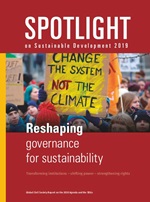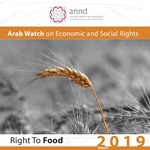Published on Fri, 2019-09-13 13:22
Civil Society watchdog says the UN week of summits 23-27 September could see more positive action on the climate emergency, on implementing the Sustainable Development Goals and could change the direction of financing for development. |
Published on Wed, 2019-09-11 12:06
Four years after the adoption of the 2030 Agenda the world is off-track to achieve the Sustainable Development Goals (SDGs). In order to turn the transformational vision of the 2030 Agenda into real transformational policies, there needs to be a shift towards more coherent fiscal and regulatory policies. In addition, policy coherence for sustainable development requires to fully take into account the externalities and spill-over effects of European policies, production and consumption patterns. With an emphasis on environmental and social impact beyond our borders, the "Spotlight Report Sustainability in Europe. Who is paying the Bill?" will be presented in Brussels on September 11, 2019. |
Published on Tue, 2019-09-10 14:55
In the 2030 Agenda for Sustainable Development, UN Member States commited to “reach the furthest behind first”. Can this commitment be applied to governance and related policies, budgets and institutions? This analysis highlights the need to move from the current pay-to-play orientation to one of democratic accountability for ‘people and planet’ and recommends a strengthened and re-positioned HLPF and UN General Assembly to drive momentum for the UN as the leader of rights-based multilateralism. |
Published on Tue, 2019-09-10 14:52
Human rights are explicitly inscribed in the purpose, vision and normative foundations of the 2030 Agenda for Sustainable Development and the Sustainable Development Goals (SDGs). This grounding of Agenda 2030 in human rights standards – a hard-won civil society victory – represents an enormously significant evolution in the historically uneasy relationship between human rights and development in the global governance arena. If human rights are to help the SDGs “transform our world”, three fundamental steps are needed to disrupt the selectivity and hypocrisy still surrounding the issue in the sphere of global development governance. First, human rights must be articulated and understood holistically, encompassing their economic, social and environmental dimensions, and recognizing their relevance to the entirety of the 2030 Agenda, not just Goal 16 on peaceful and just societies. |
Published on Mon, 2019-09-02 14:57
The right to food is a priority at the global level, and especially in the Arab region where countries with heightened armed conflicts as Syria, Yemen, Iraq and Palestine suffer from severe malnutrition. And yet, conflicts are not the only reason behind the deterioration in the food situation, because it is primarily due to the social and economic policies adopted, as well as climate change and change in production and consumption patterns. In fact, these policies have had a significant impact on small producers and rural populations. To better understand the setbacks for the right to food, the Arab Watch Report 2019 raises these concerns through 10 national and six regional papers, which all adopt an all-encompassing approach to the right to food and its aspects. |
SUSCRIBE TO OUR NEWSLETTER







